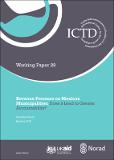| dc.contributor.author | Pöschl, Caroline | |
| dc.coverage.spatial | Mexico | en |
| dc.date.accessioned | 2016-04-11T13:02:37Z | |
| dc.date.available | 2016-04-11T13:02:37Z | |
| dc.date.issued | 2015-01 | |
| dc.identifier.citation | Pöschl, C. (2015) Revenue Pressure on Mexican Municipalities: Does it Lead to Greater Accountability? ICTD Working Paper 29. Brighton: IDS. | en |
| dc.identifier.isbn | 978-1-78118-215-4 | |
| dc.identifier.uri | https://opendocs.ids.ac.uk/opendocs/handle/20.500.12413/11178 | |
| dc.description | subnational finance; local public finance; local accountability; local taxation; property tax; fiscal federalism; fiscal decentralisation; Mexican municipalities; tax bargaining. | en |
| dc.description.abstract | Development scholars are taking renewed interest in the taxation-accountability theory, which broadly claims that if governments are dependent on taxation they will become less corrupt and more accountable to citizens. The need to raise tax revenue is said to spark incentives that lead to mutually beneficial bargaining between the government and its citizens, through which citizens agree to make tax payments in return for more accountable governance and increased influence in government decision-making. Several scholars have shown empirical evidence in support of this taxation-accountability theory at the national level, yet few have studied it at the local government level.
This paper explores this theory in the context of Mexican municipalities. It follows the strategies taken in six urban municipalities that are under considerable pressure to raise their tax revenue. It reveals the processes that evolve from such pressure, whether they lead to tax bargaining or coercive taxation, and the extent to which greater accountability can be expected as a result. It is structured as a comparative case study based on several months of field research conducted in the states of Guerrero, Tabasco, Baja California Sur, Aguascalientes, Yucatan and Coahuila.
While the findings reveal some evidence of tax bargaining the causal link to greater accountability is not straightforward, and is greatly hindered by the institutional framework surrounding local government, particularly in the Mexican context. Explicit tax bargaining largely involved individual persons or firms negotiating down their tax obligation with no wider benefits to the population. Only where taxpayers formed a narrow interest group was there a possibility of a negotiation that could lead to greater accountability. More common were implicit agreements between the local government and the taxpayers: if the government was popular and exerted trustworthiness, it collected more and the residents were more willing to pay. If the government disappointed the residents, tax collection efforts were dropped and tax evasion increased. Yet rarely did these agreements lead to greater accountability. The obstacles preventing taxation-accountability linkages from taking hold in spite of considerable tax revenue-raising pressure included limited expenditure autonomy at the local level, interference from higher levels of government or other third parties (which are more powerful relative to local leaders than to national leaders), short time horizons due to brief term limits and the prohibition of consecutive re-election, as well as a lack of transparent accounting. | en |
| dc.description.sponsorship | DfID, NORAD. | en |
| dc.language.iso | en | en |
| dc.publisher | Institute of Development Studies | en |
| dc.relation.ispartofseries | ICTD Working Paper;29 | |
| dc.rights | Revenue Pressure on Mexican Municipalities: Does it Lead to Greater Accountability?
Caroline Pӧschl
ICTD Working Paper 29
First published by the Institute of Development Studies in January 2015
© Institute of Development Studies 2015
ISBN: 978-1-78118-215-4
A catalogue record for this publication is available from the British Library.
All rights reserved. Reproduction, copy, transmission, or translation of any part of this publication may
be made only under the following conditions:
- with the prior permission of the publisher; or
- with a licence from the Copyright Licensing Agency Ltd., 90 Tottenham Court Road, London W1P 9HE, UK,
or from another national licensing agency; or
- under the terms set out below.
This publication is copyright, but may be reproduced by any method without fee for teaching or nonprofit purposes, but not for resale. Formal permission is required for all such uses, but normally will be granted immediately. For copying in any other circumstances, or for reuse in other publications, or for translation or adaptation, prior written permission must be obtained from the publisher and a fee may be payable.
Available from:
International Centre for Tax and Development,
Institute of Development Studies, Brighton BN1 9RE, UK
Tel: +44 (0) 1273 606261 Fax: +44 (0) 1273 621202
E-mail: info@ictd.ac
Web: www.ictd.ac
IDS is a charitable company limited by guarantee and registered in England (No. 877338) | en |
| dc.rights.uri | http://www.ids.ac.uk/files/dmfile/IDSOpenDocsStandardTermsOfUse.pdf | en |
| dc.subject | Economic Development | en |
| dc.title | Revenue Pressure on Mexican Municipalities: Does it Lead to Greater Accountability? | en |
| dc.type | IDS Working Paper | en |
| dc.rights.holder | © Institute of Development Studies 2015 | en |
| dc.identifier.externaluri | http://www.ictd.ac/publication/2-working-papers/22-revenue-pressure-on-mexican-municipalities-does-it-lead-to-greater-accountability | en |

